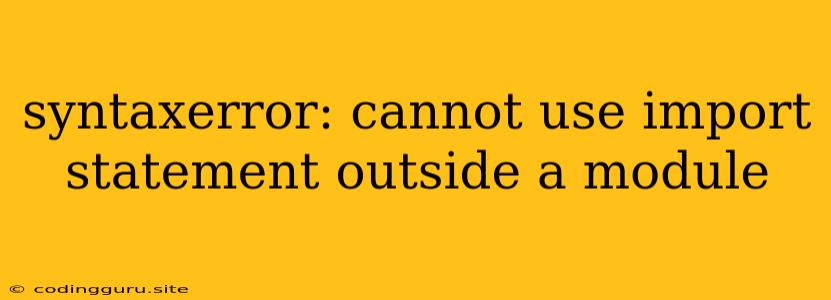The "SyntaxError: Cannot Use Import Statement Outside a Module" Mystery: Decoded!
The dreaded "SyntaxError: Cannot Use Import Statement Outside a Module" error can be quite a head-scratcher for JavaScript developers, particularly those new to modules. This error often pops up when you try to import a module within a script that isn't designed to be a module itself. Let's dive into the heart of this error and explore how to resolve it effectively.
Understanding the Problem: Modules and Their Rules
At its core, this error signifies a clash between how your code is structured and how JavaScript interprets modules. In essence, modules are self-contained units of code that can be imported and used in other files. They provide a way to organize and reuse code effectively.
Here's the key takeaway: Import statements are designed for use inside modules, not in standalone scripts. This error often arises when you attempt to use import in an HTML file, a plain .js file, or a script tag within an HTML document, all of which are typically considered "non-module" environments.
The "Why" Behind the Error: A Closer Look
Let's break down the typical scenarios where this error might surface:
-
Using
importin a standalone.jsfile: Imagine you have a file calledmyScript.jswith the following code:import { myFunction } from './utils.js'; myFunction();This code will likely fail with the "SyntaxError: Cannot Use Import Statement Outside a Module" because
myScript.jsis not explicitly declared as a module. -
Importing within an HTML
<script>tag:My Page Similar to the previous example, this approach will also trigger the error since the
<script>tag doesn't signify a module.
Solutions: Unveiling the Path to Success
There are a few main approaches to fixing this error:
-
Embrace Modules:
type="module"to the Rescue!The most elegant fix is to explicitly declare your script file as a module. You can achieve this by adding the
type="module"attribute to your<script>tag in HTML.My Page By adding
type="module", you signal to the browser that this script is a module, allowing theimportstatement to work as intended. -
The CommonJS Workaround:
requireFor compatibility with older environments that don't fully support ES Modules, you can utilize the
requirefunction (CommonJS) to load modules:// Assuming you're in a CommonJS environment const { myFunction } = require('./utils.js'); myFunction();Keep in mind that the
requirefunction is often used in Node.js and might not be suitable for all scenarios.
Essential Tips for a Smooth Module Experience
- Import Paths: Make sure your import paths are accurate and point to the correct module files.
- Node.js: For Node.js applications, use
requireif you're not working with ES Modules. - Browser Support: Always test your code in various browsers to ensure compatibility.
- File Extensions: In modern browsers, you generally need to include the
.jsextension when importing modules. - Dynamic Imports: Consider dynamic imports (
import()function) if you need to load modules conditionally or on demand.
Example Scenario
Let's consider a practical example. Suppose you have a file called calculator.js with the following code:
// calculator.js
export function add(a, b) {
return a + b;
}
You want to use the add function in another file app.js. Here's how you'd do it using ES Modules:
// app.js
import { add } from './calculator.js';
const result = add(5, 3);
console.log(result); // Output: 8
Key Points to Remember
- Modules as a Building Block: Embrace modules to create well-organized and reusable code.
- Import/Export: The Powerhouse of Modules: Understand how import and export statements work to share code between files.
- Environment Matters: Be aware of the environment (browser, Node.js, etc.) and the module system it supports.
Conclusion
The "SyntaxError: Cannot Use Import Statement Outside a Module" error is a common hurdle, especially when navigating the world of modules. By understanding the underlying principles, choosing the appropriate methods for importing modules (ES Modules or CommonJS), and paying attention to the intricacies of your development environment, you can conquer this error and streamline your JavaScript development process.
